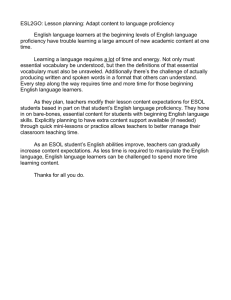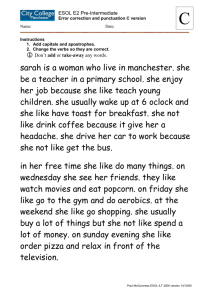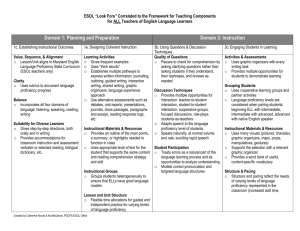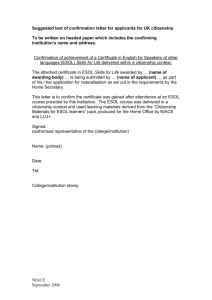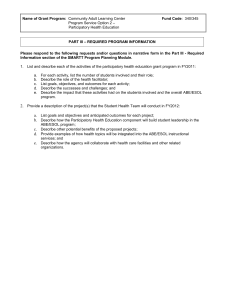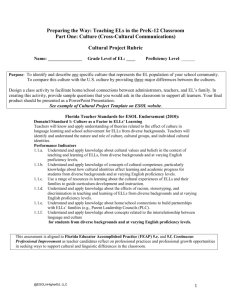ESOL Professional Development WOrkshop
advertisement
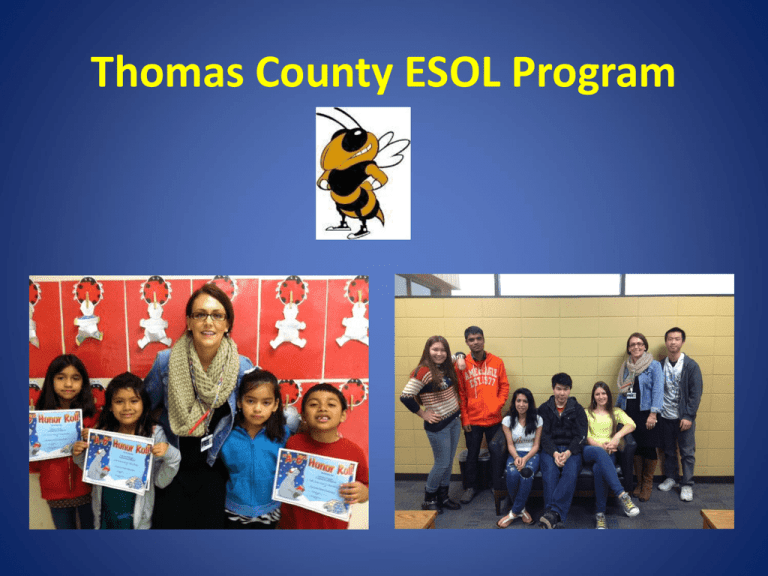
Thomas County ESOL Program Did You Know? Home Languages used by Thomas County students include: Spanish, Kazakh, Chinese, Gujarati, Q’anjob’al, Russian, Bengali, Arabic, Pilipino, and Vietnamese? What is the ESOL Program? • ESOL stands for English to Speakers of Other Languages. It is a state funded instructional program for eligible English Learners (ELs) in grades K-12 (Georgia School Law Section 20-2-156 Code 1981, Sec. 20-2-156, enacted in 1985). • The ESOL Program is a standards-based curriculum emphasizing social and academic language proficiency. • The curriculum is based on the integration of the WIDA Consortium English Language Proficiency Standards with the Common Core Georgia Performance Standards. • This integration will enable English Learners (ELs) to use English to communicate and demonstrate academic, social, and cultural proficiency. • It is critical that instructional approaches, both in ESOL and general education classes, accommodate the needs of Georgia’s ELs. • Each EL will receive instructional and testing accommodations for the classroom, as appropriate. • It is appropriate to use the home language as a means of facilitating instruction for English language learners and parental notification. • The program is instructed by a state certified teacher with the ESOL endorsement. Ms. Amy Lacher ESOL • Vision Statement: We will lead Georgia in improving the academic achievement of English Learners. • Mission Statement: The ESOL Program will ensure the equal worth and dignity of all English Learners making available the opportunity to fully gain access to programs and services provided by the State and Local Education Agencies so that English Learners can achieve to high standards, in both English language proficiency and content mastery, as needed to be successful at the postsecondary level and/or when entering the workforce. ESOL vs. Migrant Ed The Migrant Education Program (MEP) is a federally funded supplemental education program for children of migrant farm workers. The MEP personnel work as a liaison between home and school, as well as offer tutorial assistance. • To qualify for the MEP, a student must meet all three eligibility requirements: 1. Is one who is a migratory worker, or whose parent, spouse, or guardian is a migratory worker. 2. Has moved from one school district to another to seek or obtain agricultural or fishing work within the last 36 months 3. Depends on agricultural work as an important part of providing a living for his or her family. • • • Language is NOT a factor for MEP eligibility. Serves children and out of school youth from ages 3-21. Any further questions, please contact Dr. Bob Dechman or Thomas County MEP personnel-Erika Franklin and Karen Paulino 229-225-4380 ext 135 or efranklin@thomas.k12.ga.us kpaulino@thomas.k12.ga.us REMEMBER- ALL ESOL students are not Migrant, and not all Migrant students are ESOL! Who is identified as an ESOL/ELL student? • An EL (English Learner) student is classified as one: (A.) who identifies a language other than English on the Home Language Survey/Student Application, which is maintained in the permanent file And (B.) who scores below a 5.0 on the W-APT Language Screener What is the W-APT? • W-APT stands for the WIDA-ACCESS Placement Test. It is the English language screener used by the state of Georgia. • It is administered to students in grades K through 12. It is used to identify, for placement purposes, those non-native speakers whose limited English proficiency may interfere with their classroom instruction. • Used as a guideline to let the general ed. teacher know what that student can do in the classroom and their proficiency level. The WIDA Levels of English Language Proficiency 6 R 5 A 4 C 3 BRIDGING 2 EXPANDING DEVELOPING 1 E BEGINNING ENTERING Performance Definitions for Language Proficiency Levels appear in the WIDA ELP Standards Resource Guide H I N G Can Do Descriptors • This information is used as a guide as to how the EL will perform in your classroom. • These “Can Do” descriptors are WITH SUPPORT. • Cognitive development, age, educational experiences should be considered with these guidelines. Language Domains Listening Process, understand, interpret and evaluate spoken language in a variety of situations Speaking Engage in oral communication in a variety of situations for a variety of purposes and audiences Reading Process, understand, interpret and evaluate written language, symbols and text with understanding and fluency Writing Engage in written communication in a variety of situations for a variety of purposes and audiences Language Domains Support Examples Specific Examples of Sensory Supports Example Use of Graphic Organizers State Approved ESOL Instructional Models The following are instructional models used in Thomas County Schools. Models depend on student needs, teacher needs, and schedules. • Inclusion • Pull-Out • Monitor/ Consult • Class Period This year the Thomas County ESOL Program will be serving: Hand-in-Hand, Garrison-Pilcher, Cross Creek, TCMS, TCCHS, and Bishop Hall. Cross Creek’s ESOL Instructors • Ms. Jackson Mrs. Aracri The ESOL teacher will consult and provide… • A variety of techniques, accommodations, and activities designed to teach ELs the appropriate grade level standards, making learning comprehensible and accessible. • Language objectives to incorporate with the CCGPS in the classroom • Assistance in parent involvement and conferences • Provide resources for student, teacher, and family • Assistance in building a culturally supportive classroom The general education teacher will provide…. • • • • • • Content area and grade level knowledge A language enriched environment A cultural supportive classroom Opportunities for ELs to use the language Instruction in written and oral language Testing and instructional accommodations as decided on each EL’s plan Academic Language Proficiency • Language-based Academic Achievement • Content-based • Reflective of the varying stages of second language acquisition • Reflective of conceptual development • Representative of social and academic language contexts • Representative of the school’s academic curriculum • Tied to the WIDA language proficiency standards • Tied to Common Core Georgia Performance Standards • Ex: describe • Ex: photosynthesis QUIZ: Successful Practices for ELLs 1. Get to know your student- Have informal conversations with your EL 2. Use visuals, gestures, graphs, charts 3. Modify the complexity of content using simplified material 4. Encourage interaction among students 5. Have meaningful communication with students daily 6. Cooperative learning 7. Allow students to use their native language to facilitate learning as needed 8. Repetition, Repetition, Repetition 9. Hands-on manipulative 10. Frequent comprehension checks ACCESS for ELLs • ACCESS for ELLs™ stands for Assessing Comprehension and Communication in English State-to-State for English Language Learners. • It is a standards-based, criterion referenced English language proficiency test designed to measure English language learners’ social and academic proficiency in English. • It assesses social and instructional English as well as the language associated with language arts, mathematics, science, and social studies within the school context across the four language domains. • • • • • The four language domains are: speaking, listening, reading, and writing. The ACCESS for ELLs™ test is given during a specific window each year. ELs who register during the testing window must take the ACCESS. Those ELs who are monitored do not take the ACCESS test. A student may exit ESOL after scoring a 5.0 composite score on Tier B or C of the ACCESS OR A student may exit ESOL after scoring a 4.0 composite score AND a 4.5 or higher literacy score of the ACCESS for ELLs test AND pass the English Language Arts portion of the Georgia Criterion Referenced Competency Test (CRCT). At which point a LAC (Language Assessment Committee) form would be completed and approved by the LAC team. • Each grade cluster has three tiers (A,B,C): K, 1-2, 3-5, 6-8, 9-12 What language do students need to be able to participate in your class? •In social contexts ? •In Language Arts ? •In Math ? •In Science? •In Social Studies? WIDA’s ELD Standards Social & Instructional Language Language of Language Arts Language of Mathematics Language of Science Language of Social Studies Academic Language Standard 1 Standard 5 Standard 2 Standard 3 Standard 4 English Language Proficiency Standard 4: English language learners communicate information, ideas, and concepts necessary for academic success in the content area of SCIENCE. Grade Level Cluster: 1-2 Language Domain Level 1 Entering Listening identify scientific facts about weather or environment depicted in pictures or photographs (such as temperature, seasons, precipitation) from oral statements find examples of scientific hypotheses about weather or environment from pictures or photographs and oral descriptions use words or phrases related to weather or environment from pictures/photographs (such as temperatures, seasons, or precipitation) locate scientific words about weather or environment from pictures or photographs Speaking Reading (such as seasons, temperature, precipitation) Writing produce scientific words or diagrams about weather or environment from pictures or photographs (such as seasons, temperature, precipitation) Level 2 Beginning Level 3 Developing Level 4 Expanding Level 5 Bridging respond to oral questions about weather or environment using pictures or photographs predict results related to scientific hypotheses about weather or environment from pictures or photographs and oral scenarios interpret results, along with reasons, based on scientific hypotheses about weather or environment from pictures or photographs and oral reading of grade level materials restate scientific hypotheses about weather or environment from pictures or photographs ask WH- questions about weather or environment from pictures or photographs predict results and provide reasons based on scientific hypotheses about weather or environment from oral or written information evaluate and weigh options related to scientific hypotheses about weather or environment from oral or written information select scientific hypotheses about weather or environment from pictures or photographs with text respond to scientific questions about weather or environment from visually supported text match predictions and reasons related to scientific hypotheses about weather or environment to written text infer results and reasons based on scientific hypotheses about weather or environment based on grade level text (re)state scientific hypotheses about weather or environment from pictures or photographs answer scientific questions about weather or environment from pictures or photographs make predictions and/or give reasons based on scientific hypotheses about weather or environment explain results and provide reasons based on scientific hypotheses about weather or environment What happens after an EL exits the program? • When an EL meets the criteria for exiting the ESOL program, they are monitored for two consecutive years. • A student may re-enter ESOL when the classroom teacher feels a student is falling behind academically due to language and has gone through the RTI process. • A EL who is monitored may still need accommodations in the classroom! Resources Mrs. Ross’ ESOL Website: www.RossESOL.weebly.com How to Create a Welcoming Classroom Environment: www.colorincolorado.org/educators/reachingout/welcoming CREDE- Center for Research on Education, Diversity, and Excellence: www.crede.ucsc.edu Resources about Language and Culture: www.cal.org/resources WIDA: www.wida.us Department of Education: www.doe.k12.ga.us Help! They Don’t Speak English Starter Kit: www.edvantia.org/products/pdf/HelpKit.pdf Math Support- includes a Spanish glossary and parent guide in Spanish www.keymath.com "Doing What Works" site offers a user-friendly interface to quickly locate teaching practices that have been found effective by the department's research arm, the Institute of Education Sciences, and similar organizations. http://dww.ed.gov/ Parent Communication • TransAct- free web-based program with templates that can be translated in many languages. www.transact.com • Translation services www.translate.google.com • Language Line Who is TransACT? TransACT provides parent notices in multiple languages to help school districts comply with complex federal parent communication mandates. GenEd Collection: Available Languages* TransAct Tool Kit • Each School has a login: – Hand in Hand: – Garrison: – Cross Creek: – TCMS: – TCCHS: – Bishop Hall: The Elements of the MPI The Language Function The Content Stem/Example Topic The Support Think… Language Function Content Stem/Example Topic Follow oral directions to design area maps using manipulatives and illustrated examples in small groups Instructional Support I AM HERE TO HELP! What’s the ACCESS again? 1.Practice looking at an ACCESS Score Report -What’s important? -What do I compare? 2. Look at your student’s scores as a group and analyze 3. Plot your scores on the Can Do Descriptors chart Let’s plot Jose Carlos’ ACCESS for ELLs results on the CAN DO Descriptors: Listening 4.1 Speaking 6.0 Reading 5.0 Writing 3.8 4.1 6.0 5.0 3.8 ESOL Endorsement • • • • Annual cohorts through CaseNex Free for Title III Consortium members 3 courses, online Course titles: ESOL and Multicultural Education Issues ESOL Applied Linguistics Methods and Materials for Teaching ESOL The “key” to our success with EL students is planning, flexibility, and communication with parents and co-teachers!
